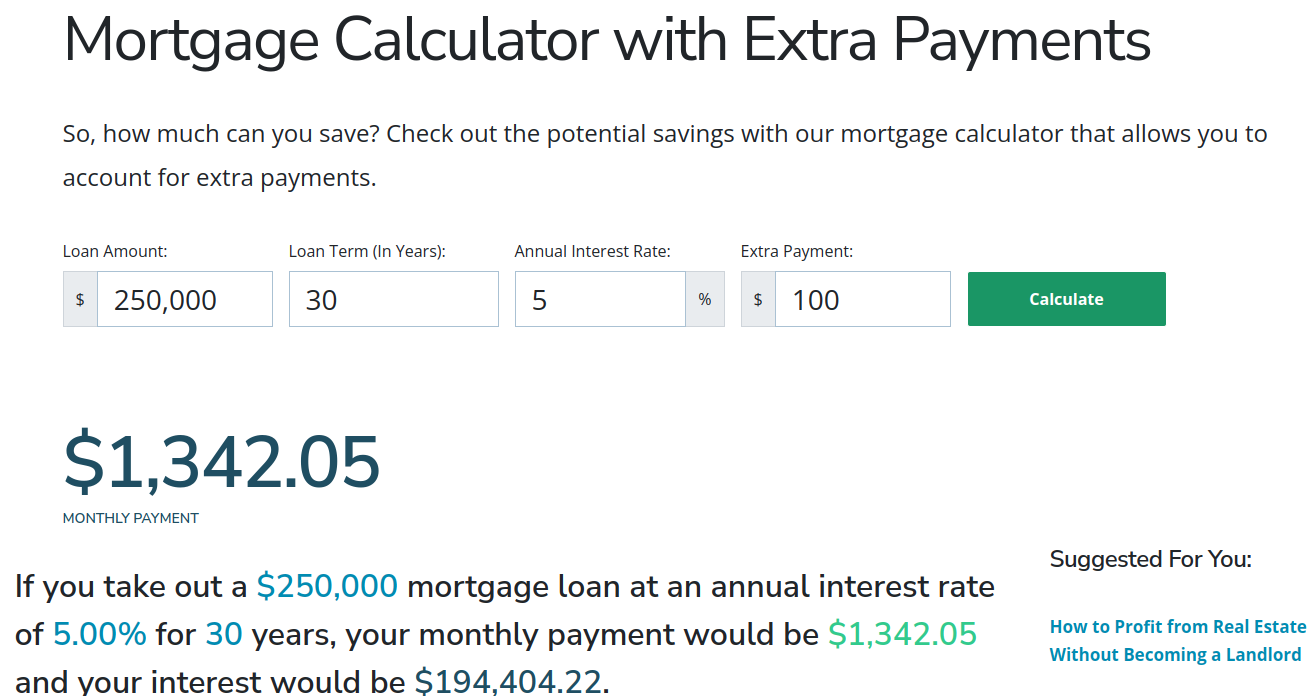How Does the Mortgage Calculator with Extra Payments Calculator Work?
The mortgage calculator with extra payments is a tool that shows you how extra payments toward your mortgage can benefit you as a borrower.
To use the calculator, you’ll need to enter information about your current mortgage. You’ll need to provide the start date of your loan, the original amount you borrowed, the annual interest rate (APR), and the repayment term.
Of course, you’ll also need to provide the dollar amount of the extra repayments you plan to make each month.
If you aren’t sure about any of these details, you can look for them on the last account statement you received, or call your lender for assistance.
With that information, the mortgage calculator with extra payments will start by showing the total number of payments you’ll make on your mortgage, the total amount of interest you’ll pay, how much you will save in interest by making these extra repayments, and an updated estimate of your payoff date.
Finally, you’ll find two useful graphics to help you visualize the outcome of making extra mortgage payments. One graphic is a chart that indicates how much you’ll pay in principal and interest each year. The second graphic illuminates the updated amortization schedule.
Example of Mortgage Calculator with Extra Payments

Let’s see how the mortgage calculator with extra payments works in practice.
In this example, let’s say that you took out a 30-year mortgage with a loan amount of $250,000 and a 5% interest rate. The loan start date was January 1st, 2021. But you’ve decided to start making extra monthly repayments of $100 each month.
With this information, the calculator determines that the total amount of repayments you’ll make over the course of the loan is $444,404, and $194,404 of those funds will be interest payments. But by making extra payments of $100 each month, you will be able to save $38,735. Plus, save four years and three months off the term of your loan.
How Making Extra Mortgage Payments Works
When you make an extra mortgage payment, you can choose to have the extra funds applied to the principal balance, which causes the loan balance to shrink faster. Since each interest payment is based on your principal balance, extra payments toward the principal will lead to lower interest costs over the course of your loan.
Benefits of Making Extra Mortgage Payments
When you make extra mortgage payments, you can potentially tap into big interest savings. Although the exact savings will vary based on your unique loan, it is possible to save thousands of dollars in interest costs. Beyond the potential interest savings, making extra payments will help you pay off your mortgage more quickly and eliminate the mental and financial burden of a major, monthly debt payment.
What's Included in a Mortgage Payment
A mortgage payment is made up of several components. These include:
Principal. The principal is the amount of money you initially borrowed to purchase your home. In most cases, the initial principal will be equivalent to the price of the home minus the down payment.
Interest. With each mortgage payment, you’ll make interest payments based on the APR attached to your loan and the remaining principal balance. Interest payments are the lender’s fee for allowing you to use the funds when you need them.
Taxes. Property taxes are often included in your mortgage payment to ensure you stay current on this hidden cost. They vary depending on location.
Homeowners insurance. Lenders will require you to maintain an appropriate homeowners insurance policy. The cost is usually included in your mortgage payments.
Private mortgage insurance (PMI). In some cases, private mortgage insurance may be included in your mortgage payments. Typically, this is a cost you’ll pay if you don’t make a down payment of at least 20%. The PMI requirement may be dismissed once you’ve gained equity in the home either by paying down the balance or because the market value of your home has increased, or both.
How to Make Extra Mortgage Payments
The main benefit of making extra mortgage payments is minimizing the amount of interest paid over the course of the loan. With that, it is critical to ensure your hard-earned money is being applied to your loan correctly.
Unfortunately, some lenders will accept the extra money and simply apply it to your next mortgage payment. But prepaying your mortgage payment isn’t the goal – saving on interest is – so it's critical to confirm the details of your payment with the lender.
Most lenders now provide an option on the online or mail payment form that allows you to specify that any extra funds go toward the principal. Or, you can call and request that your extra payment will be applied to the principal instead of prepaying the interest. Although a phone call may be a chore, it is an important step to ensure that you’re actually saving money.
Ask An Expert: Is It Smart to Pay Extra Principal on Mortgage?
The choice to make extra mortgage payments is a personal one. Although there is no denying that making extra mortgage payments will eliminate this debt more quickly and save interest costs, it is possible to get more value out of your money elsewhere.
For example, you may want to set up a more stable financial foundation before moving forward with extra mortgage payments. That could include eliminating higher interest debt or building an emergency fund.
Or, you may be confident that your money could earn 6% invested in the market, so paying off your mortgage with a 3% interest rate, effectively “earning” you 3%, may not provide the greatest return.
In the end, you’ll need to decide for yourself if paying off your mortgage early is the right move for your finances.


